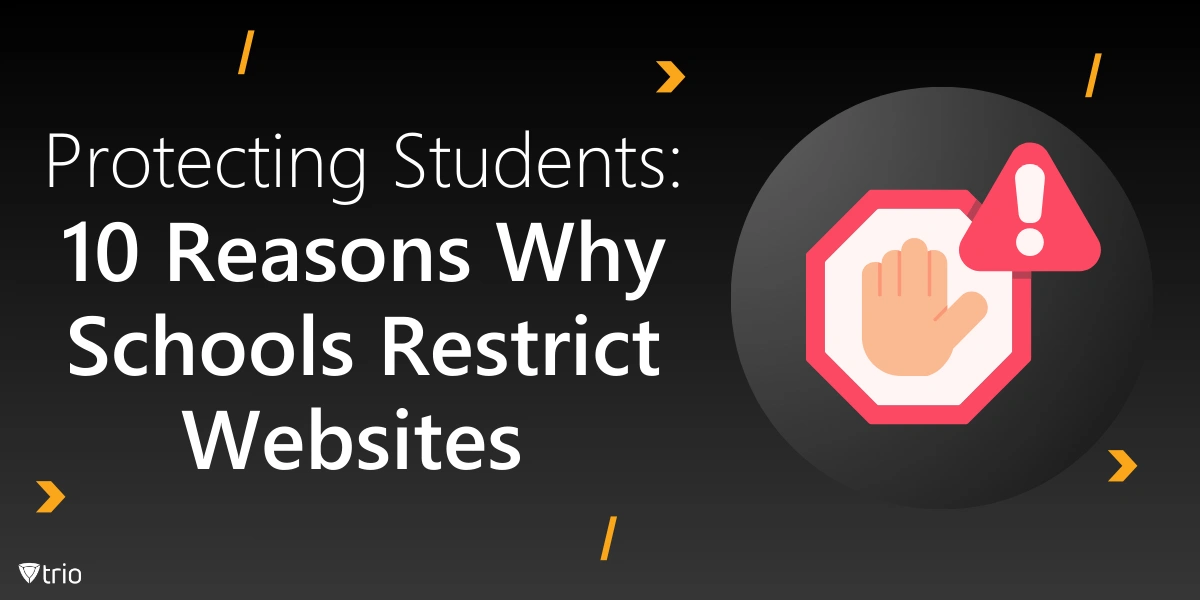Since the invention of the internet, information has become much easier to come by than in the past. Nevertheless, schools try to add restrictions to specific websites, which caused many debates among students, teachers, and parents. Reasons for these restraints are important for comprehending the issues of educational settings in such scenarios.
Below are ten reasons why schools block websites for students.
1. Inappropriate Content
Most of the websites that are in the social web provide information that would need to be considered as improper for children as it contains information that is in a way violent, obscene, or racist. Schools block such sites in order to shield learners from the wrong influences.
2. Distraction
Facebook, gaming sites, moviemaking sites, and other fun sites can altogether make the students compromise on their studies. Through banishing various sites, schools set the focus and even work to create an innovative learning environment.
3. Cyberbullying Prevention
Use of social networks and other types of messengers can cause cyberbullying. Schools have pulled such sites to prevent cases of bullying and ensure that there is a right climate in school.
4. Safety Concerns
There are different risks in sites effecting students such as terrorists, online criminals or fake businesses. Schools limit access to prevent these risks and safeguard student’s privacy.
5. Academic Integrity
Some of the websites designed to provide homework solutions or solutions to questions posted on forums are rather favoring cheating and plagiarism. Such measures in place, schools ensure that only deserving students get to use these resources which in effect cut pleas by students for special consideration when caught cheating.
6. Compliance with Legal Regulations
Generally, schools have legal requirements to follow that protect the kids from specific content, for example, the Children’s Internet Protection Act that mandates filtering known as dangerous for children.
7. Network Security
Some websites may be unsafe and contain a virus, or attempt to obtain passwords, identity, or money. Having the following sites blocked will benefit the school’s network as well as its users.
8. Encouraging Productive Use of Technology
For that reason, when certain sites are blocked, schools are also directing students towards the more productive uses of technology.
9. Resource Allocation
Schools have limited capacity and more specifically they have constrained bandwidth. Restricting easy-accessible non-educational sites such as networking, games etc. guarantees availability of enough resources for educational uses.
10. Promoting Digital Citizenship
Schools set goals to promote responsible behavior but one of them is having proper behavior in cyberspace. That is why, using the essential tools teachers have vast opportunities to explain to students how some sites could be dangerous for them, why people should care about their privacy and have more respect towards others when they communicate online.
Impact of Internet Access in Schools
Introduction of internet facilities in learning institutions has worked a positive change in enabling learning institutions offer innovative environment that improve teaching and learning process.
The use of the internet has affected methodologies in school, learning achievement as well as motivation and resources for the students.
Firstly, the existence of internet in school helps educators to accept various strategies of teaching in schools. Thus, teachers can utilize multimedia content, communicative tools, data from the Web and many others in their lessons. It also enhances and expands what is taught in classes and allows for all learner needs to be met based on how they learn.
In addition, the internet in education enhances student participation since they can easily learn in groups. Discussion forums, group assignments and virtual classrooms help students to interact not only with fellow students, but with those outside their immediate environment.
In doing so it not only trains learners to think critically and solve problems but also helps them to feel that they belong to one community. However, the issues arising from school internet have their benefits. Some of these include; challenges like distraction, connectivity disparities, and safety were concerns.
Schools are required to prevent these kinds of risks and make the internet a useful environment for learning instead of distraction or inequity.
Lastly, the internet can be considered as one of the valuable tools that are beneficial for developing the educational process and enhancing cooperation among students.
With the advancement in technology and its adoption in the learning institutions it is important to address the issue with an aim to promoting the enhancement of the resource for future generations.
The Rationale Behind Schools Blocking Websites
The decision to block websites is for the safety of students, their academic performance and integrity as well as the educational environment.
First of all, the main purpose of the websites restrictions is to protect students from certain dangerous sites. A number of sites have obscene or malicious content to include violations such as the use of violence, nudity, and sites devoted to cyberbullying.
Through limiting access educational institutions want to set an environment which will be good for learning, spare students from psychological harm or Yerkes-Dodson effect influences. In addition, there is the issue of academic process integrity. In the light of availability of information on the internet the problem of cheating has become rife.
When students use websites that offer solutions to homework or exam questions, the goal of schools is defeated. Through using this method, institutions deter students from cheating and help them to read materials that enhance their learning. Fifth and finally, schools try hard to make students avoid all types of distractions that hinder their productivity.
The use of the internet can be disrupted by social networks, games and other entertaining sites that do not promote students' educational activities. In this connection, in order to foster concentration and productivity among students, schools try to regulate what websites students are allowed to visit.
Popular Websites that Get Blocked
- Social Media: Most of the time, websites such as Facebook, X (former Twitter), and Instagram are blocked because they are so distracting and contain things like bullying.
- Gaming Sites: From the similar sites it may be lost a lot of time for studies and the sites themselves are not educational.
- Adult Content: By default, any site containing any form of nudity, erotic materials etc. is prohibited to ensure that the students will not Terry gain access to such sites.
- Streaming Services: Social platforms like YouTube or Netflix might be restricted but there can be some educational videos allowed.
- Anonymous Chat Sites: These may present some risks such as being involved in wrong interactions, and they are commonly filtered.
Impact of Blocking Websites
- Positive Learning Environment: This is important because by eliminating all the distractions schools are able to provide the most appropriate environment for learning.
- Safety: Filtering is useful to safeguard students from what is wrong with the world wide web and wicked materials.
- Encouragement of Responsible Behavior: Limitations can cause conversations about the safety of the internet and consequent misuse of technology.
Challenges and Considerations
While there are many reasons for blocking websites, some challenges include:
- Overblocking: Some schools may perhaps restrict certain sites when actually such sites are useful for educational purposes, it becomes very frustrating for students and teachers.
- Equity issues: Learners may have variability in the access of internet and technology at home besides which school coverages may enhance this variability.
- Adaptability: Because new technology platforms are constantly being created and new content is constantly being produced, schools have to update their filters from time to time.
Having known the purpose of website blocking in the school environment, educators, students, and parents should unite in favour of creating effective conditions for studying in the context of using the World Wide Web.

Trio Enhances Safety and Learning
Internet filtering in schools has enabled many to attempt to offer greater protection to students from inappropriate or harmful content on the Internet.
Effective Internet filtering in schools needs to go far beyond blocking particular sites; it must create an environment conducive to learning and respectful of the diverse needs of both students and teachers.
Customizable and dynamic filtering tools offered by Trio Mobile Device Management (MDM) allow schools to optimize the balance between security and access.
Want to enhance your school’s internet filtering strategy? Try a free demo of Trio today and see how our MDM for schools can help you create a safer, more effective learning environment.
IT admins. Want to learn how you can block or filter websites for your educational institution? Schedule a free demo today to find out how Trio can assist you in providing advice.
Trio Business offers a comprehensive MDM solution for SMBs, simplifying device deployment, security, and monitoring. With features such as remote device lock and automated patch management, it focuses on enhancing productivity while ensuring security compliance.
Get Ahead of the Curve
Every organization today needs a solution to automate time-consuming tasks and strengthen security.
Without the right tools, manual processes drain resources and leave gaps in protection. Trio MDM is designed to solve this problem, automating key tasks, boosting security, and ensuring compliance with ease.
Don't let inefficiencies hold you back. Learn how Trio MDM can revolutionize your IT operations or request a free trial today!





